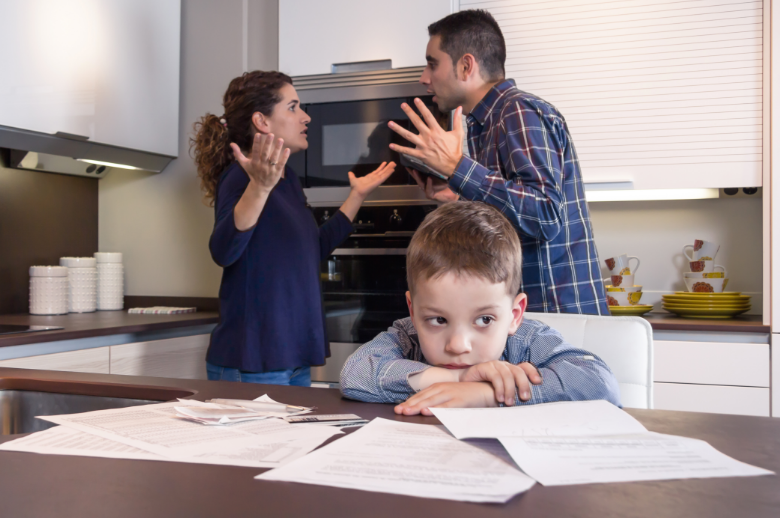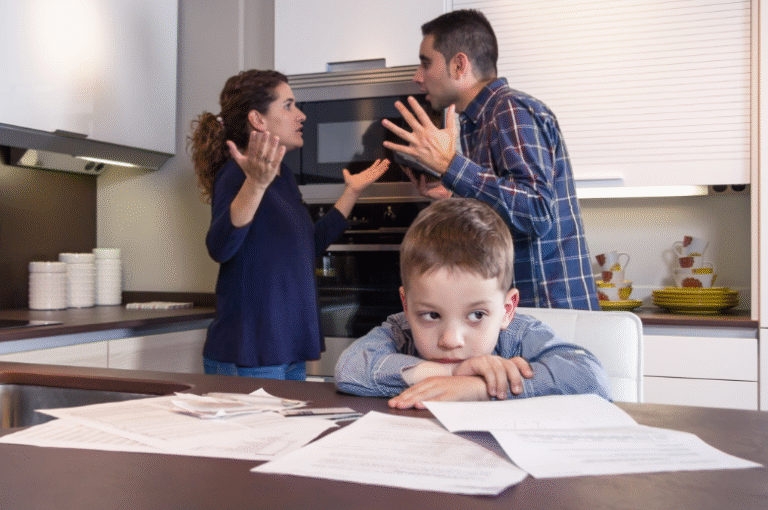Getting Divorced? How to Help Your Child Thrive
Written by Aleena Hellebyuck, MA, CAADC-DP

Even though a divorce is typically about disagreements between two partners, the impact of divorce can take a toll on everyone in the household… especially children. While you are navigating the ending of your relationship, there are many things that children need to feel stability and support through these life transitions.
One option to consider is to invest in counseling for divorced parents, which can help you and your ex-partner work together to ensure your children feel secure.
What Is Parenting (Co-Parenting) Counseling?
Counseling for divorced parents focuses on helping former partners develop effective co-parenting skills to resolve their disagreements, allowing them to prioritize their children’s well-being. Traditional therapy is often structured for partners who are still in a romantic relationship and trying to work through their differences. On the other hand, this type of counseling provides a framework for healthy communication between parents who are no longer living together.
Our parenting support services recognize that divorce doesn’t end your parenting partnership. You’ve had children together, which means that you need to find a way to continue working together to support the best interests of the children. We offer structured sessions to help parents learn to separate personal conflicts from their shared responsibility of raising emotionally healthy children.
Do you feel overwhelmed about the logistics of shared custody? You aren’t alone in this struggle. Many parents look for professional support to navigate this transition. Plus, you are going to continue to have conflicts to work through in the future because of your children’s ongoing needs and changes in different stages of life. Co-parenting counseling for divorced parents is a great place to start, so that you can learn practical tools to address these challenges.
Why Children Really Need This Support
Children experience divorce differently from adults. As adults, you are processing the end of a marriage and a relationship. Your children may feel helpless in the situation and grieve the loss of their family structure. Research shows that children whose divorced parents maintain healthy communication show better academic performance and stronger emotional resilience.
Without support, children often become messengers between parents or feel responsible for their parents’ emotions. Counseling for divorced parents prevents these harmful dynamics by establishing clear communication channels between adults in order to minimize the impact on children.
Dr. Lena Agree and our team have seen how much children mirror their parents’ coping strategies, which is why we encourage parents to take a proactive approach with counseling. Your commitment to good communication and personal management demonstrates healthy ways for children to navigate difficult emotions.
Building Communication Bridges Between Parents
Effective co-parenting requires that you develop and implement new communication skills. Through counseling for divorced parents, we teach you structured methods that reduce conflict while addressing necessary parenting decisions.
Professional Communication Strategies
Our goal is to help parents establish respectful interactions that always prioritize children’s needs:
- Written communication is often the best method for logistics.
- We encourage parents to set and maintain consistent rules across households.
- Boundaries need to be respected, while also remaining flexible depending on unexpected circumstances that arise.
Managing Emotional Triggers
Parents often slip into old arguments during child exchanges. Our counseling provides techniques to recognize and interrupt these cycles before they impact children.
Key Benefits of Co-Parenting Counseling
The advantages of co-parenting counseling for divorced parents extend beyond immediate conflict resolution. Our practice has seen incredible results when parents commit to this process.
- Consistency Across Homes: Children thrive with predictable routines. Counseling helps parents stay on the same page about life logistics such as bedtimes, homework policies, and discipline strategies.
- Reduced Parental Conflict: Learning effective communication decreases overall tension. Parents feel less triggered when they have clear protocols and boundaries.
- Better Decision-Making: Major decisions about education and healthcare require collaboration. Counseling for divorced parents provides frameworks for making choices based on children’s best interests.
- Emotional Healing: When parents successfully co-parent, children experience less conflict over loyalty. They enjoy time with each parent without guilt, which allows for healthy development.
The Help You Need for an Effective Co-Parenting Plan
Divorce marks the end of a marriage, but your children still need both parents working together. Counseling for divorced parents provides the roadmap for this new chapter, ensuring your children feel loved and secure.
For more information about these transformative services, reach out to our office. We offer full transparency about our rates and insurance information, which gives you straightforward access to the support you need during this time. We offer flexible scheduling to accommodate custody arrangements.
Don’t let conflicts shadow your children’s childhood. Contact us today to build a healthier co-parenting relationship. Your children deserve parents who work together for their benefit. Our team is here to help every step of the way, offering customized therapy plans to find the ideal solutions for your family.
Aleena Hellebyuck, MA, CAADC-DP is a limited license professional counselor with expertise in couples counseling, and individual therapy for adults and children. Contact us today at (248) 219-2548 or lena@drlenaagree.com to schedule a consultation with Aleena in Birmingham, MI.
No FAQs found.
